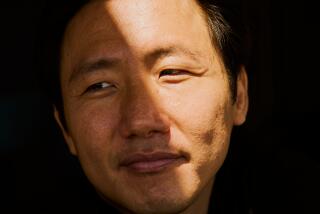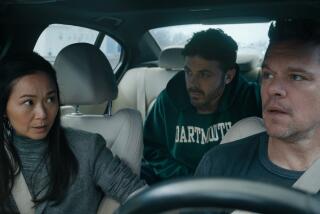Sherlock’s a mess. Watson’s a snob. The youngest players of ‘The Irregulars’? Extraordinary
The Baker Street Irregulars, a gang of street kids “as sharp as needles” who appeared occasionally in the adventures of Sherlock Holmes to help the master detective in his work — they “go everywhere and hear everything” — have been rebooted into Netflix’s “The Irregulars,” a winning young-adult detective series that puts a supernatural spin on the SHU (the Sherlock Holmes Universe, that is).
Things are getting nasty in Victorian London — nastier than usual. A darkness is creeping in. People are getting “powers.” It’s like a 19th-century “Stranger Things” (whose Millie Bobby Brown recently starred in another Netflix-based Holmesian fantasy, “Enola Holmes”).
Going about their business are our heroes: Bea (Thaddea Graham), a natural leader; Jessie (Darci Shaw), her sensitive half-sister, who is thought to be ill but is only (it will soon be understood) psychic; Billy (Jojo Macari), serious and scarred; and Spike (McKell David), cheeky and cheerful, the Artful Dodger of the crew. (In Beatles terms, they are, respectively, John, Paul, George and Ringo.) Having been through a mill or two already — most are veterans of the workhouse — they are hard to rattle yet not so brave as to make their daring dramatically meaningless. They have set up subsistence housekeeping in a roomy expanse of a London cellar in a noisy lower-class neighborhood ahistorically overlooked by the famous Baker Street.
Into their circle comes Leo (Harrison Osterfield), a poor little rich boy who also happens to be Prince Leopold, the historical son of Queen Victoria — you can literally not get much more Victorian. As a hemophiliac, Leo has been confined to the palace his whole life — even the lawn seems to be off limits, as he gazes down longingly at other boys playing cricket and girls adjusting their garters. Having had a glimpse of Bea at her most formidable, dressing down the royal minder that he has pressured into taking him for a ride through the city, he falls in love and takes the first opportunity to sneak back to her world. With some comic difficulty, he searches for and attaches himself to the crew; though he does not reveal his royal identity, he does call them “chaps” and will disappear back to the palace like Cinderella in reverse.
The new Netflix movie “Enola Holmes,” based on the Mancy Springer mystery series, stars a delightful Millie Bobby Brown, Henry Cavill and Sam Claflin.
In a more sinister manner, they are also being stalked by Dr. Watson (Royce Pierreson), who finally makes himself known to Bea — “No need to be afraid,” he says unconvincingly, “I’m a doctor” — with an offer of work, helping on a case: “We are reputable men and as such don’t have access to the less reputable parts of London.” Babies are being stolen. He mentions but does not name his partner. The kids need the money, and we’re off.
Victorian England is of course both the spiritual and actual home of detective fiction, as well as the setting for myriad tales of supernatural and science-fictional horror. And though his hero was rationality embodied, Holmes creator Arthur Conan Doyle himself believed in worlds beyond this world and the possibility of communicating with them. It’s a natural match. (One episode takes the form of a backdated Agatha Christie-esque country house mystery, with a tarot theme, references to the actual Victorian occult secret society the Golden Dawn and a character named Alan Crawley to make you think “Aleister Crowley.”)
Created by Tom Bidwell (“My Mad Fat Diary,” “Watership Down”), the eight-part series is both episodic and serial as the big mystery is teased out through individual, independently solved mysteries. (Many have to do with stealing things: various body parts, identities, those babies.) The titles are represented as “chapters” for literary gravitas and continuity, though the series isn’t immune to silliness or senselessness, albeit the silliness is at times intentional and the senselessness goes with the territory.
The narrative, in its long and short arcs, is perfectly fine if overly baroque at times and overly predictable at others. Is the soft-spoken American man in white linen (Clarke Peters from “The Wire,” “Da 5 Bloods,” “His Dark Materials”) who appears to Jessie in a psychic astral Louisiana swamp not what he seems? There are rules.
It’s a young-adult show — for young adults of all ages — which is to say there is salty language and some sexual material (though only a smidgen of sex) and modern pop music on the soundtrack. “The city is a hard place, sir, it’s not for those of a … delicate constitution,” Leo’s minder warns him, and as much may be said of the series itself. Sensitive viewers (or parents of sensitive viewers) may want to click to something less dark and violent. Things get intense on a regular basis.
Laurie R. King wanted the 16th novel in her Mary Russell/Sherlock Holmes series to be a distraction from the last few years of turbulence, but she has long used the Holmes pastiche to make social and political churn feel like a great adventure.
As is not uncommon in such stories, the younger generation must guard against the older: evil, incompetent or unfortunate adults, unbalanced by their own unresolved business and skewed views. This includes the grown-up good guys. Watson is in a perpetual state of stiff-necked choler tinged with snobbery — “I am better educated, more wealthy and stronger than you are,” he tells Bea, who is unmoved. And Sherlock (Henry Lloyd-Hughes, “The English Game”), when we finally meet him, is a mess on many levels. (Lloyd-Hughes does bring out the humor in him.) Supporting characters Inspector Lestrade (Aidan McArdle), landlady Mrs. Hudson (Denise Black) and Mycroft Holmes (Jonjo O’Neill) all appear in mostly less pleasant twists on their literary originals; they have their secrets, their agendas and their secret agendas.
“The Irregulars” is handsomely mounted and well played all around, but appropriately it’s the younger players — not as young as their characters necessarily — who raise the series into something out of the ordinary. Graham, the most interesting element in the young-adult medieval fantasy “The Letter for the King” (also on Netflix), is especially impressive: she is small but sturdy and has a way of planting herself defiantly, shoulders back, like a character in a social realist opera; there is something fierce in the way she knocks on a door. Yet she’s vulnerable at the same time.
Ultimately, the monster movie means less than the human drama the tribe is living, its alliances and affections, understandings and misunderstandings and reconciliations, its coming of age by coming to terms with whatever outside forces, natural or unnatural, that would seek to exploit, subject or destroy it. And it handles that very well. The show is full of feeling — its subject, stated explicitly and often, is family and friends and the people who have your back: your Scooby Gang, your Bowery Boys, your indivisible team.
“That’s the thing about us,” one of them says. “When one of us is missing, we’re crap.”
‘The Irregulars’
Where: Netflix
When: Any time
More to Read
The complete guide to home viewing
Get Screen Gab for everything about the TV shows and streaming movies everyone’s talking about.
You may occasionally receive promotional content from the Los Angeles Times.







